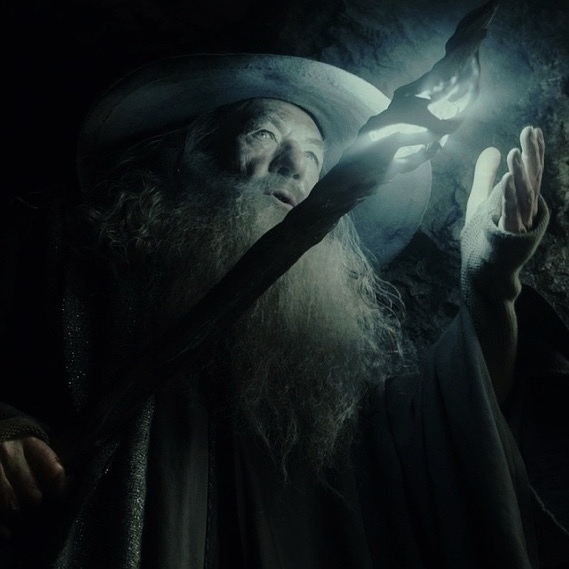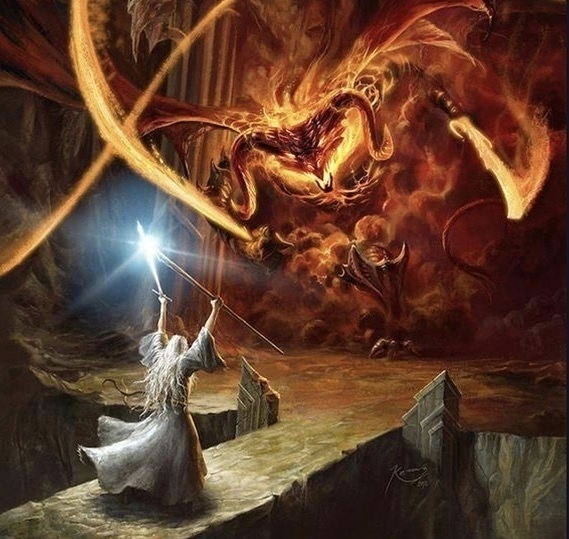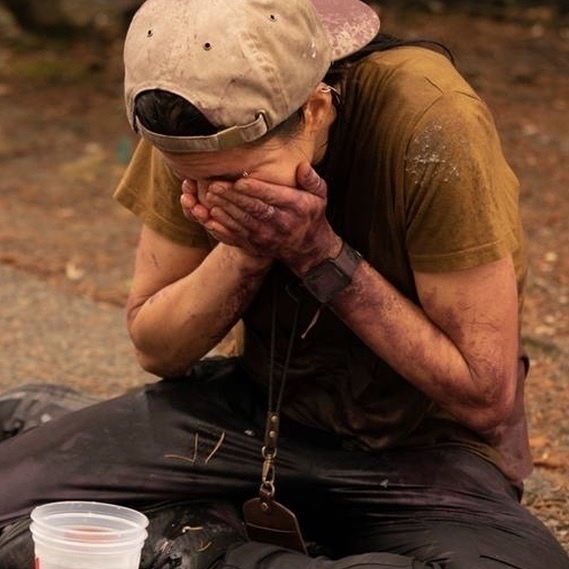I’ve never particularly identified with Gandalf. I took some “Which Middle Earth person are you?” quiz once, and got Gandalf, and that bothered me a little, because my self image does not involve any belief that I am an ages-old demigod sent from the beyond to … do things.
The closest anyone has ever come to likening me to Gandalf is probably a friend at work who took to calling me “The Bhagwan” for a period, and I get that on the merits of my beard alone, though I was told there was also some sort of “calming and warm presence” component that would have served me well as a spiritual leader.
Anyhow, I’m going to play along with the idea that I’ve been quietly *trying * to be like Gandalf all these years, because I was talking to Al about The Current State of Affairs in the World while we were out for a walk, and I realized I don’t feel very hopeful at this moment, but for reasons people might not identify with much. I haven’t felt this way since Obama was in office, and then Clinton before him, because when people from “my side” are in power, it always feels like you can see the hard limits of our society and culture; how much we’re willing to change or flex or bend or improve, and I would like more of those things than we seem to be capable of.
So, we went down the rabbit hole of “what on earth are we even supposed to do about this?” and that took us a few places, including the idea that things feel so profoundly polarized right now that it is very hard to engage with much of anybody. There are so many presumptions of bad faith and so much eighth-dimensional chess going on. There’s a huge amount of energy for change, but right now it is a very wild energy, and people believe all sorts of contradictory things that they apply to other humans in a destructive, reductionist way that will leave us poorer when this moment has swept through.
Basically, it’s a good time to ask yourself what you know about Gandalf. I have identified two Gandalfs.
There’s the one with the wizard staff that lightens the shadows a little, bringing comfort to the people right around him. We’ll call him “the little light in the dark Gandalf.” This one:

The Little Light in the Dark Gandalf provides that little light not because it will solve the biggest problems or strike down the worst evils, but because the dark itself is oppressive enough, and it is comforting to gather in some pale patch of light.
Then there’s the one with the staff and the sword who is going to fight the Balrog, even though he’s pretty sure he’s fucked. We’ll call him “the Balrog-fighting Gandalf”:

I am guessing that most people would prefer a Balrog-Fighting Gandalf action figure over a Little Light in the Dark Gandalf action figure. He’s just sort of getting down to business with the biggest problems. He’s all righteousness. If he has a tagline, it is “there is nothing wrong with punching Balrogs.”
I remember a long while back, when I took it upon myself to be a Balrog-fighting Gandalf. It felt pretty good to be the righteous one with the sword, and it felt even better when I “won” against a person who was being bad. I felt very clear about my rightness, and dead certain about their wrongness. Looking back, through a lens of whether the way I was behaving was sustainable – that is to say, behaving in a way I’d feel comfortable behaving every day – I’d say I wasn’t. Right side of history, wrong side of my moral compass, I guess you could say.
Some years I can overlook that more easily than I can others. Other years, the things that are going around me, and the way people are behaving in response to them, cause me to say, “I don’t think I’m okay ignoring the voice I’m hearing inside myself. I can see there’s something going on over there, and I’m sort of attracted to the heat and light it is generating, but most of the people I agree with on what to make of that thing are behaving in a way I’m not okay with. I can run over and join anyhow, and ignore what I’m hearing from myself, or I can figure out another way to be useful somewhere else, in some other way.”
None of this is simple, and I try to maintain a measure of humility when I do judge. I am pretty sure that the person who pushed this journalist to the ground, maced her, and called her a “slut” thinks he was being Balrog-fighting Gandalf:

I bet I agree with the person who did that on a few particulars, to the extent we probably both hate fascists, both want to live in a society that is committed to the end of domination, and want to live in a community that is free of people coming in from the outside to intimidate and antagonize us.
But I’m not okay with what he did at all. He pulled on a thread that unravels a lot of the things he would probably claim to be defending or protecting, and he’d probably cite Karl Popper while pulling on it. Maybe more importantly to me than the fact that he did that is the way in which attempts to bring it up with friends, and to ask if assaulting journalists is really good praxis, was met with uncomfortable silence. I’m relieved nobody I know very well tried to defend the assault, but I’m bothered that beating up a journalist wasn’t something worth noting and condemning beyond reliable “both-sides!” voices and right-wing goons who had already tried to bear-spray her but took advantage of the opportunity to condemn “the left.”
That’s just a meatspace example of the mounting discomfort I feel with the way people I’d ordinarily consider ideological confrères – or at least second cousins – are behaving.
For the past couple of years, I’ve carried around my sense of growing difference with others I once considered to be like me a little guiltily, because I stopped doing things I used to do as part of my political and philosophical identity and wondered if I had finally hit some cultural tipping point and had changed without realizing it. I wondered if other people could see it in me. I felt some measure of despair, because some of that political and philosophical identify was wrapped up in being Balrog-fighting Gandalf, and if I wasn’t on some crusade, waving a sword around and punching Balrogs, what was I?
Then a few days ago, I got a Slack message from someone who told me that when they worked with me they felt included and safe. Beyond any ideology, politics, or programs, they simply felt included and safe.
They feel the things a million HR trainings, best-sellers, and tweet storms are ostensibly aiming for. Maybe they’re even hitting the mark. It’s hard to say. One idea I find very bleak is that our institutions are too corrupt to save, and that rights are best secured when corporations have deemed them beneficial to the bottom line. Any sense of “progress” you might measure that comes from a milieu where entities with a fiduciary responsibility are adjudicating matters of human dignity and freedom has to be qualified at least a little.
My takeaway from that Slack message was that someone who doesn’t always feel safe or included does so around me in part because of things I do that aren’t particularly as noteworthy or as fun as, say, Balrog-punching.
The thing I said to Al as we walked along the Springwater in the dark was, “I think we just have to know what we know for ourselves, and not because we need people to agree with us. And we need do the best we can to provide a little bit of light for the people right around us.”
I am going to leave the Balrog-punching to someone else for a while.